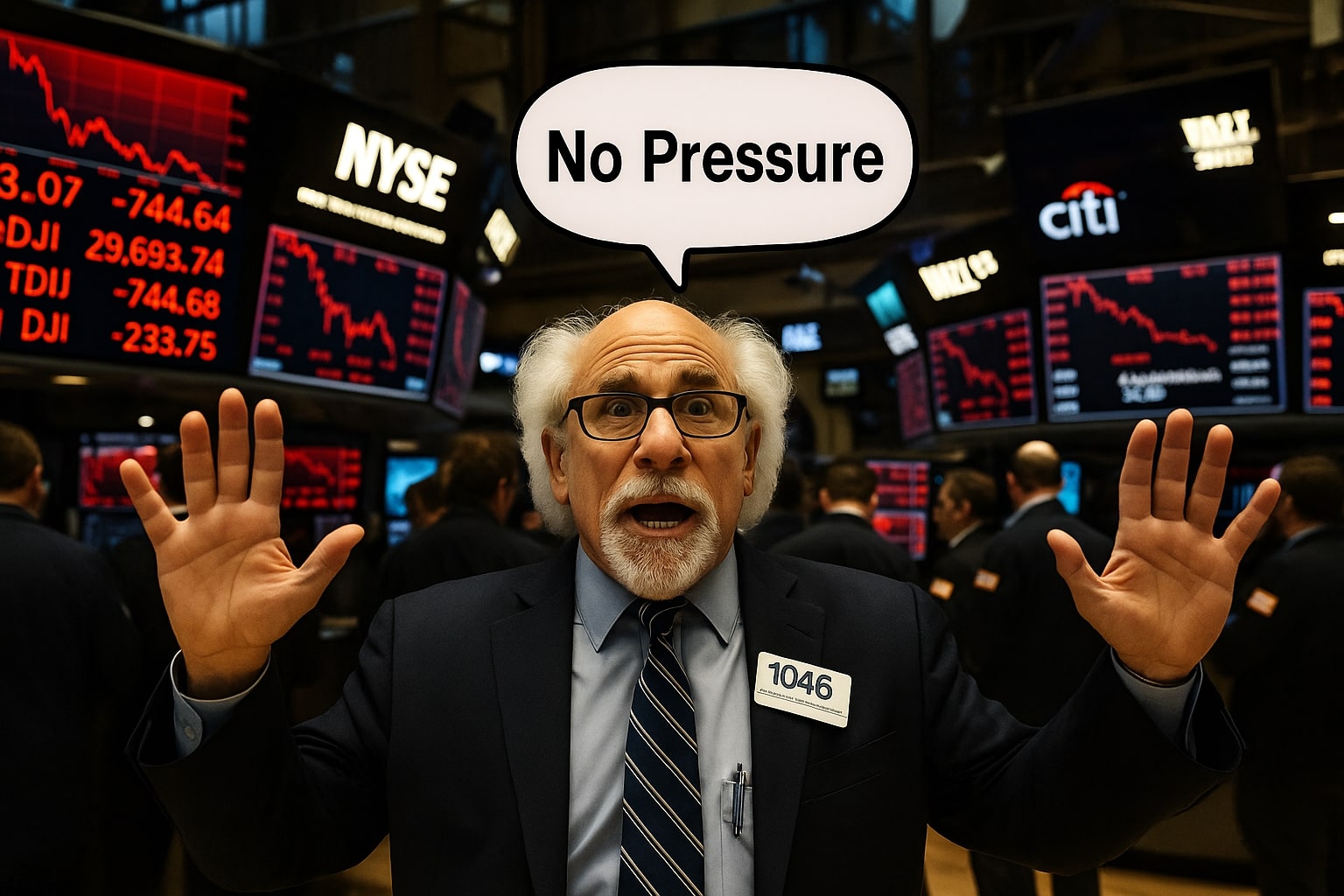
Trading News - S&P 500 Slips as Walmart Price Increases and Retail Data Drive Market Slowdown
Will the S&P 500’s 3-day rally continue despite the pullback, or are tariffs and retail data signaling a larger market correction? | That's TradingNEWS
U.S. Stock Market Faces Pressure as S&P 500 Struggles to Extend Rally Amid Rising Tariff Concerns
The U.S. stock market faced downward pressure on Thursday, with major indices losing momentum after a brief rally earlier this week. The S&P 500 slipped 0.4%, snapping its three-day winning streak as traders began to digest mixed economic data and concerns over ongoing trade tensions. The Nasdaq Composite also saw a drop of 0.6%, while the Dow Jones Industrial Average lost 163 points, or 0.4%. Market participants are now looking for further cues on economic health, particularly after a deal between the U.S. and China that temporarily alleviated tariff concerns.
The recent rise in stock prices was largely driven by optimism surrounding a temporary truce between the U.S. and China, especially regarding tariffs. However, despite strong earnings from companies like Walmart, market sentiment has shifted toward caution. Walmart reported better-than-expected earnings but warned that rising tariffs could lead to price increases in the coming months, potentially putting pressure on consumer spending.
Retail Sales and Producer Price Index (PPI) Data Bring Mixed Signals to Investors
Economic data released Thursday provided a mixed outlook on the U.S. economy. Retail sales in April rose just 0.1%, a sharp slowdown from the previous month's 1.7% increase. This was in line with economists' expectations but indicated that consumer spending had weakened significantly due to rising tariff pressures. A deeper dive into the data showed that spending on non-essential goods, such as electronics and sporting goods, had declined, while food and beverage sales remained relatively stable.
Meanwhile, the Producer Price Index (PPI) for April dropped 0.5%, much more than the anticipated 0.3% increase. This marked the largest monthly decline in the PPI since 2009, driven by a significant drop in service prices, which could point to a slowdown in cost pressures for businesses. These economic reports have raised concerns that inflationary pressures are easing, which could affect the Federal Reserve's approach to interest rates.
Walmart and UnitedHealth Share Volatility Amid Trade War and Regulatory Concerns
Among the big names in the stock market, Walmart's stock fell by about 4% on Thursday despite reporting better-than-expected earnings. The retailer has been grappling with the ongoing trade war and rising costs due to tariffs. Walmart’s CFO stated that while the company would try to absorb some of the tariff-related costs, price hikes were inevitable. The warning sent a ripple through the retail sector, with concerns that other companies might face similar challenges.
UnitedHealth, another major player, saw its stock slide nearly 15% after a report emerged stating that the Justice Department is investigating the company over possible Medicare fraud. This marks another setback for the health insurer, which has been under pressure from regulatory scrutiny. The news compounded an already difficult week for the company, as it was already facing investor concerns over rising healthcare costs and tighter regulations.
Tech Sector Stays Resilient Despite Broader Market Weakness
In contrast to the broader market, the technology sector has continued its strong performance. Companies like Nvidia, Tesla, Meta Platforms, Amazon, and Alphabet have posted strong gains over the past week, with Nvidia and Tesla both up more than 14%. The Nasdaq Composite, driven by tech stocks, gained 5.9% this week, far outpacing the S&P 500, which rose 3.8%, and the Dow, which gained 1.5%. This resilience in the tech sector is attributed to strong earnings reports and continued demand for cloud services, AI-driven applications, and digital infrastructure.
Foot Locker Soars 83% Amid $2.4B Acquisition Deal with Dick's Sporting Goods
In a standout corporate move, shares of Foot Locker surged by 83% after the company announced a merger with Dick's Sporting Goods for $2.4 billion. The acquisition, which will see Dick's pay $24 per share for Foot Locker, has caused a massive rally in Foot Locker's stock. The deal is seen as a strategic move to strengthen Dick’s foothold in the global retail market, particularly in Europe and Asia, where Foot Locker has a substantial presence. While Dick’s stock fell 9% on the news, Foot Locker’s huge jump underscores the market's enthusiasm about the acquisition.
Oil Prices Tumble After Trump’s Iran Comments Lead to Supply Concerns
In the commodities sector, oil prices tumbled by more than 3% after President Trump’s comments about a potential nuclear deal with Iran. The U.S. president stated that negotiations with Iran were progressing well, which raised concerns about a potential increase in Iranian oil exports. U.S. crude oil fell to $60.91 per barrel, while Brent crude dropped to $63.91 per barrel. Traders are now eyeing further developments in the U.S.-Iran relationship, as a deal could bring more oil supply into the market at a time when global demand is already under scrutiny.
Petrobras Gets a Boost with Jefferies Upgrade on Cost-Cutting Measures
In a more positive development for energy stocks, Petrobras (PBR) received a ratings upgrade from Jefferies, which set a price target of $15.30, representing a 26% upside from its current trading price of $12.15. This upgrade comes after the company has implemented a series of cost-cutting measures and is focused on increasing capital discipline to weather lower oil prices. Despite Petrobras' stock falling by nearly 6% this year, Jefferies believes the company's improved efficiency and strategic focus will drive better performance in the near term.
Federal Reserve Faces Growing Pressure as Economic Data Suggests Risks
Amidst these market developments, the Federal Reserve’s outlook remains under intense scrutiny. Chair Jerome Powell warned that the U.S. may be entering a period of more frequent supply shocks, which could challenge the central bank’s ability to manage inflation and economic growth. With inflationary pressures easing and economic data showing mixed results, the Fed’s decision-making process will become increasingly important. Markets are already pricing in the possibility of interest rate cuts by the end of 2025, and further data releases will likely influence these expectations.
Conclusion: Navigating Uncertainty and Market Shifts
As the market faces a period of uncertainty, with fluctuating commodity prices, ongoing trade tensions, and regulatory issues impacting major corporations, investors are urged to stay cautious. The recent gains in tech stocks have provided some relief, but broader market challenges, including the impact of tariffs on consumer spending and the potential for a global supply glut, suggest that volatility could continue in the near term. With key economic data on the horizon, the market will be watching closely for signals that can either confirm or undermine the current optimism.
That's TradingNEWS
Read More
-
GPIQ ETF Price Forecast: Can a 10% Yield at $52 Survive the Next Nasdaq Selloff?
09.02.2026 · TradingNEWS ArchiveStocks
-
XRP ETF Price Forecast: XRPI at $8.32, XRPR at $11.86 as $44.95M Inflows Defy BTC and ETH Outflows
09.02.2026 · TradingNEWS ArchiveCrypto
-
Natural Gas Futures Price Forecast: Will The $3.00 Floor Hold After The $7 Winter Spike?
09.02.2026 · TradingNEWS ArchiveCommodities
-
Stock Market Today: Dow Back Under 50K While S&P 500 and Nasdaq Push Higher as Gold Reclaims $5,000
09.02.2026 · TradingNEWS ArchiveMarkets
-
USD/JPY Price Forecast: Can Bulls Clear 157.5 Without Triggering a 160 Intervention Line?
09.02.2026 · TradingNEWS ArchiveForex


















